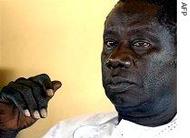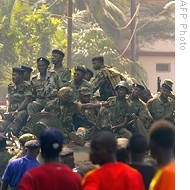voa标准英语2008-Military Group Claims to Have Taken Power in Gui(在线收听)
Mutinous soldiers in Guinea say they have dissolved the government and constitution.
Coup follows announcement of president's death
 |
| Lansana Conte (2002 file photo) |
The coup attempt followed an early morning broadcast announcing President Conte's death. In that broadcast, the head of Guinea's armed forces and other military leaders stood beside the head of the national assembly, Aboubacar Sompare, who called for the supreme court to follow the constitution and make him president.
The coup announcement that followed said the newly-formed National Council for Democracy would take charge of the destiny of the Guinean people. Government ministers were ordered to report to a military barracks that has been the scene of several unsuccessful mutinies against the Conte government.
Prime minister denies claim military is in charge
Guinean Prime Minister Ahmed Tidiane Souare says his government has not been dissolved. He told French radio that those behind the coup attempt have not used force and the government is calling for understanding and compassion from all Guineans, especially the military.
Former colonial power France says it will oppose any military take-over. Assembly Speaker Sompare told French television there are negotiations underway between soldiers backing the coup and those supporting constitutional rule.
Army Chief of Staff General Diarra Camara told VOA that he did not think the coup had been a success and appealed to Guineans to follow rules for a peaceful transition of power as outlined in the constitution. Asked what would happen if they did not, General Camara said, "By then, I may not be chief of staff anymore."
Army chief explains motivation for coup
 |
| Guinean soldiers on armored vehicles patrol streets of Conakry, 23 Dec 2008 |
Announcing the coup attempt, Captain Moussa Camara said the military was taking power to stop what he called widespread corruption, impunity, anarchy, and a catastrophic economic situation.
Camara said members of the Conte government are, in large part, responsible for what he called an "unprecedented economic and social crisis." He said a joint civilian-military council reflecting the nation's ethnic balance would run the country until new elections.
A reporter for VOA in Conakry says the situation is confused, but the capital remains calm as most people are following orders to stay at home.
President Conte died after long illness
President Conte had been ill for some time. The nation's second president was thought to be in his 70s and was a heavy smoker who suffered from diabetes. He ruled Guinea since a 1984 coup that followed the death of post-independence leader Ahmed Sekou Toure.
President Conte first won election in 1993 in a vote protested by political opponents because some results were canceled. He survived a February 1996 army mutiny protesting pay in which at least 40 people were killed. The president was captured by mutineers who later freed him when he promised to raise troop salaries.
President Conte was re-elected in 1998 after his main challenger was jailed for sedition. A referendum changing the constitution to remove term limits allowed President Conte to run again in 2003. Most opposition parties boycotted that ballot, and he was re-elected with more than 95 percent of the vote.
President Conte also survived an assassination attempt by dissident soldiers in January of 2005.
Following his death, Guinea's constitution calls for presidential elections within 60 days. Legislative elections had already been planned for next year.